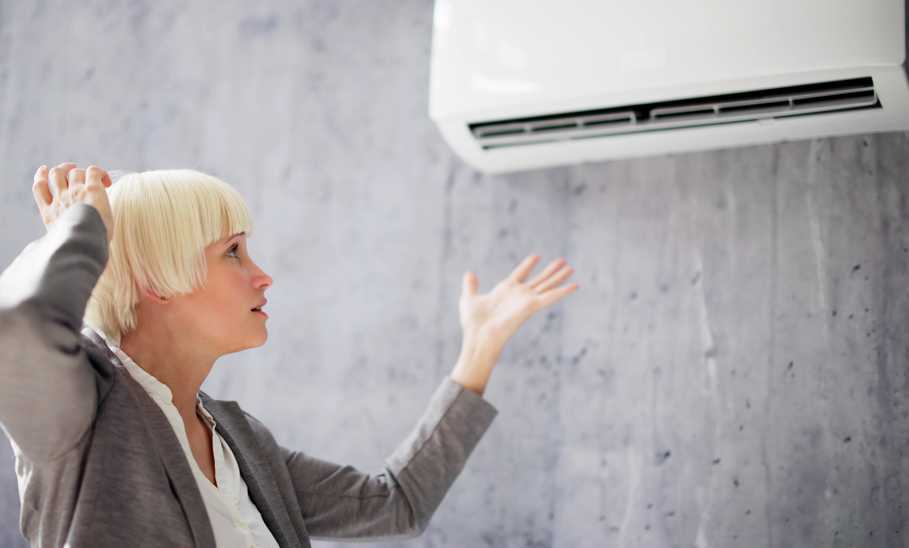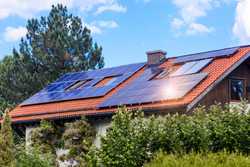Why is My AC Not Blowing Cold Air? An Expert Guide to Keep Your Cool

Our evaluations and opinions are not influenced by our advertising relationships, but we may earn a commission from our partners’ links. This content is created by TIME Stamped, under TIME’s direction and produced in accordance with TIME’s editorial guidelines and overseen by TIME’s editorial staff. Learn more about it.
Your HVAC, or heating, ventilating, and air conditioning system, functions as the lungs of your home, says Michael Rubino, a mold and air quality expert, environmental wellness advocate, and founder of HomeCleanse, a company with a vision to end the worldwide health epidemic caused by poor air quality and toxic indoor environments. As such, it’s important to ensure that you properly maintain your system.
“If issues such as microbial growth develop in the machine, microscopic particles will blow throughout the entire building, lowering the indoor air quality and causing unwanted exposure,” Rubino explains.
Air conditioners work by sucking air into ducts through a central, large intake vent. The compressor, which, in central units, is the portion installed outside, raises the pressure and temperature of a refrigerant (in gas form), sending it to the condenser coil where it is converted to a liquid. The evaporator (or cooling) coils remove heat and humidity from the air that has been sucked into the system while a blower circulates it over the coils.
In order to effectively cool your home, an AC unit needs to be able to circulate the cold air relatively evenly throughout the entire house. When your system stops blowing cold air, there are various potential causes.
To help explain these issues and understand how to remedy them (and when to call a professional), I talked to Rubino, Traci Fournier, vice president of Operations at One Hour Heating and Air Conditioning, and Glenn Wiseman, certified technician and sales manager at Top Hat Home Comfort Services, a home improvement, maintenance and repair services company in Ontario, Canada..
Even the best air conditioners (including the best window air conditioners) can occasionally suffer from an issue that will cause them not to blow cold air. No air conditioner brands are categorically exempt from this happening.
Wiseman says there are a few reasons an AC unit operates inefficiently or doesn’t blow cold air at all; a clogged condenser or evaporator coil, a dirty air filter, or an electrical problem with the thermostat or compressor.
“Any of these options could be causing your air conditioner not to work properly and should be regularly monitored for,” he says.
As soon as you notice that your AC is no longer putting out cold air, the first thing to do is check that your thermostat is set correctly. If your system is turned on but not working properly, the temperature setting could be too low or high for the current weather conditions.
“Some models,” Wiseman explains, “have an auto-cool feature that turns off when the house reaches its desired temperature; this could explain why your system isn't blowing as much cold air as it should be on hot days.”
Other reasons include the following:
Wiseman says a blocked air filter is the most common issue he sees with HVAC systems and window units. Air filters prevent dust and other particles from getting into your ductwork and system.
If they are covered in dust, air moves through the filters much slower, causing your system to be more inefficient. If they’re blocked entirely by debris, your system could stop working altogether.
“Thankfully,” Wiseman says, “this particular scenario is usually a quick fix: simply inspect your filters and make sure they are clean and that nothing blocks them.”
In general, you should replace your air filters every three months and clean them every month.
Another reason that your AC may not be blowing cold air is that the refrigerant or coolant levels are low. Coolant is just another name for refrigerant. Different systems can utilize different types of refrigerant. Freon (R-22) used to be the standard, but most modern systems use Puron or Puron Advance, which is more efficient and less harmful to the environment.
Low refrigerant levels could be caused by a leak somewhere in your system and likely means you need to call a professional. If you’re relatively handy and know where your AC service valves are located, you can check the refrigerant levels yourself with something called a diagnostic manifold gauge set (more information on that below).
If you notice ice buildup anywhere on your unit, this could be caused by dirty filters or coils or by issues with the refrigerant levels.
Check the filter and see if it needs cleaning. Give the ice time to melt before turning the unit back on. If this doesn’t work, call a professional.
The evaporator coil (also called the cooling coil) is located on the air intake side of the indoor portion of your AC unit, which is called an air handler. This coil absorbs the heat and humidity from the indoor air.
If it's dirty, Rubino says to clean it with a microfiber towel and soft brush. If it’s frozen, turn the machine off and allow it to unthaw. Clean the coil and turn the machine back on.
If it re-freezes, call a professional.
This is the unit that sits outside of the home.
“You can attempt to clean it,” says Rubino, “but professionals are typically the best to ensure that the proper tools are used and none of the fins are bent.”
The drain line is where the excess humidity, moisture, and condensation from indoor air is funneled to the outside. It’s a PVC or metal pipe that extends from the drain pan under the air handler. You can attempt to clean it out, using a wet/dry vac but it's best to call a professional.
This encompasses a wide variety of issues and should always be addressed by a professional, says Rubino.
“Make sure your thermostat is set to cool,” says Fournier, “sometimes someone may change the setting by accident.”
Also, as explained above, if your system possesses an auto-cool feature, make sure it is set to the correct temperature for the weather. It’s possible that the temperature in your home is low while the ambient humidity is high enough that it feels sticky and too warm.
“Dirty air filters reduce airflow, which limits the way your air is evenly distributed throughout your home,” says Fournier. If your air filter is dirty, change it.
The condenser unit is located outside your home. The condenser coil runs around the unit's periphery, usually protected by a removable cover or panel.
“It’s usually lined with thin, shiny metal fins,” explains Fournier, “If these fins are blocked by dirt or grass or covered by a tarp for protection, they can't draw in enough air, which can lead to warm air blowing into your home.”
“Inside all those coils is refrigerant,” says Fournier. This chemical compound is designed to convert from a gas to a liquid and back as it absorbs heat from inside your home and releases it outside. A leak can cause your AC unit to run longer than normal or to blow warm air as well as increase your utility bills.
If you want to check your refrigerant levels yourself, you’ll need a diagnostic manifold gauge set which consists of hoses and pressure gauges. To use, first turn the unit off, then locate the service valves, which should be among the refrigeration lines, usually next to the outlet of the outdoor compressor unit. The valves allow you to isolate your compressor from the rest of the system so you can measure the “charge” or pressure of the refrigerant that’s present in the system.
Attach the manifold gauge to the service valves (they’ll screw on). Turn the AC back on and record the readings on the pressure gauges. For most systems, this should be between 30-40 PSI. If the gauge readings are below these levels your system requires more refrigerant. In this instance, it's probably prudent to call a professional to add coolant—which calls for precise calculations of the amount of refrigerant to add in relation to the temperature and capacity of your particular unit. A professional can also determine why your levels were low to begin with ( and the probable cause is a leak somewhere).
“When an AC or heat pump is blowing warm air due to a refrigerant leak, always trust a professional HVAC technician to make the fix,” advises Fournier.
As well the refrigerant/coolant issue, a couple of other instances when you should seek professional help include the following:
For HVAC systems, “If your thermostat is not correctly commanding the system,” says Wiseman, your AC may use extra energy, causing unnecessary wear and tear.”
Call a professional to see if you need a repair or a full system replacement.
Another sign is gas leaks.
As Wiseman says, the smell of rotten eggs in your home can really ruin your day.
The smell could indicate a sulfur gas leak in your HVAC system. If you suspect a gas leak, even odorless, get out of the home and call a professional to assess the system and perform a repair or replacement.
“Generally, if you have not replaced your HVAC in over 10-15 years,” says Wiseman, “it may automatically be time for an upgrade.”
Other telltale indicators include rising utility bills, uneven temperatures in your home (super cold temperature in one room while too warm in another), a system that runs continuously, or you keep having to shell out money for repairs.
![[object Object] [object Object]](https://i5.walmartimages.com/seo/DELLA-12000-BTU-Wifi-Enabled-20-SEER-Cools-Up-550-Sq-Ft-110-120V-Energy-Efficient-Mini-Split-Air-Conditioner-Heater-Ductless-Inverter-System-1-Ton-He_62ffa6a2-674f-4763-8221-a45900fdba85.4fd7a949940121730216104c23ab8d44.jpeg?odnHeight=640&odnWidth=640&odnBg=FFFFFF)
Yes, absolutely. “There may be an issue with the condenser, drain line, or refrigerant, which can be further damaged by keeping the unit running,” says Wiseman.
“Yes, as cool air escapes outside and warm air comes inside, your AC has to work harder to reach optimal temperatures,” says Wiseman.
Fournier advises that when hot temperatures start to set in, clean your evaporator coil. Rising temperatures usually bring an increase in humidity, which can cause mold and mildew.
“Your AC system is responsible for pulling excess moisture out of the air, and when your air conditioner is not performing at its best, your whole house can get damp,” she explains.
This can cause dry goods to spoil, mildew to appear on the walls and ceilings (or even on your clothes), and mold to spread throughout the house. To prevent this, homeowners need to drain the pan below the condenser (the drain pan) and clear all lines to allow excess water pulled from the air to drain out.
If you aren’t familiar with how to complete this, call an HVAC technician for assistance.
First, as stated, replace your air filters. Wiseman advises doing this once every three months during the cooling season (spring through fall) and once every six months during the heating season (fall through spring).
“Your filters are critical to keeping the system running smoothly and your costs low,” he says.
Another efficiency tip he often gives is to install weather stripping along windows and doors. Target spots such as the top of your doors to seal out drafts and prevent cool air from escaping, as well as warm air from infiltrating.
“Also caulk around windows, floors, and other potential sources of air leakage,” he says. Additionally, explore your home's attic and basement or crawl space to see where insulation has deteriorated and replace it if needed.
“This relatively cheap and small project,” Wiseman says, “will help you save money on energy costs.”
When I lived in Houston, I also installed an attic fan which helped tremendously by venting hot air from the top of the house as well as prolonging the life of my roof shingles.
Lastly, install a programable thermostat. This allows you to set different temperatures for different times of the day or different days of the week. A lower temperature in the winter while you are out of the house or a higher temperature in the summer will help reduce energy usage and lower your utility bill.
Fournier suggests also cleaning your condenser unit as well as checking all AC vents regularly to make sure they are clear and clean. Additionally, keep areas around your AC unit clean and insulate exposed ductwork located outside of the conditioned space.
Once every three months during the cooling season (spring through fall) and once every six months during the heating season (fall through spring).
The information presented here is created by TIME Stamped and overseen by TIME editorial staff. To learn more, see our About Us page.



